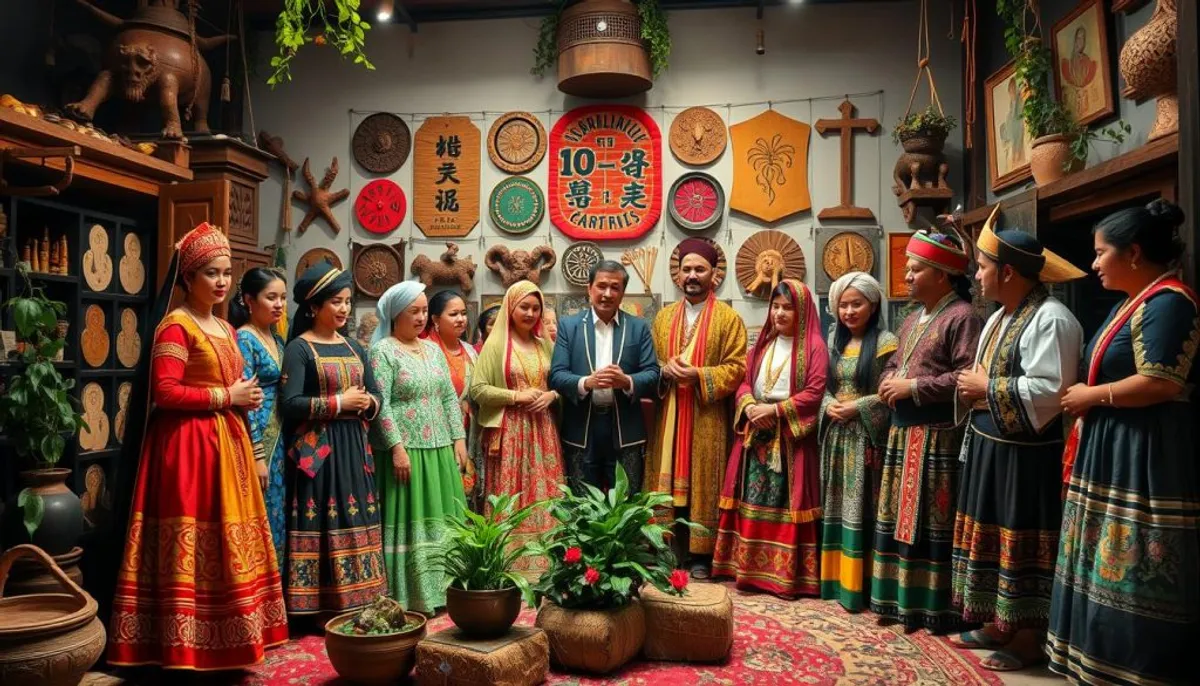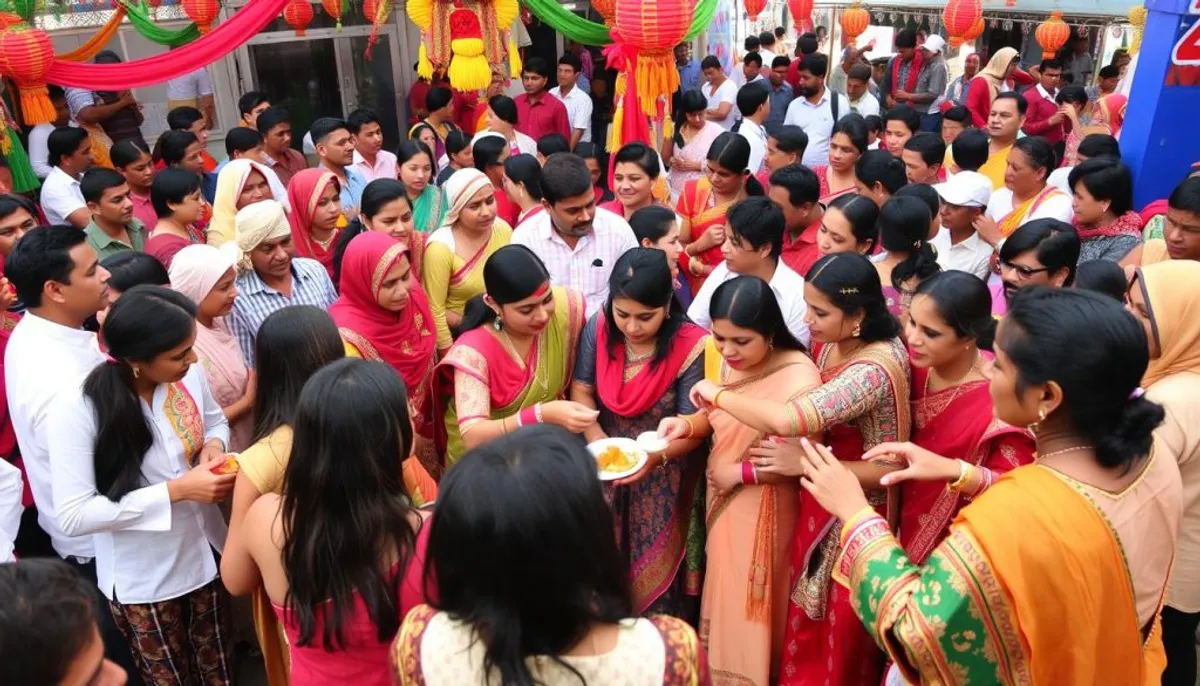Traditions are essential to our cultural heritage and our identity. They connect the past to the present, passing down customs and values from generation to generation. However, they come with advantages and disadvantages to be aware of.

Traditions provide emotional stability and reference points in a changing world. They help preserve our heritage and can boost the local economy through cultural tourism. However, they can also hinder progress and innovation, and perpetuate social inequalities.
In this article, we will examine the multiple aspects of traditions. We will discuss their role in our society and the balance between respecting heritage and adapting to modern realities.
Understanding the essence of tradition in our society
Tradition, the foundation of our cultural heritage, profoundly influences our society. It symbolizes the collective memory and ensures social continuity between generations. To understand its importance, let us examine its various aspects and its essential role in our daily lives.
The definition and role of tradition
Tradition encompasses the practices, beliefs, and knowledge passed down over time. It creates a common framework, fostering togetherness and a sense of belonging. Family, religious, and cultural traditions are crucial for transmitting values from one generation to the next.
The historical importance of traditions
Traditions are at the heart of our cultural identity. They help preserve ancestral know-how, the arts, and the gastronomy of each community. This richness is a precious cultural heritage, a testament to our history and a source of inspiration for the future.
Intergenerational transmission
The transmission of traditions ensures the longevity of our collective memory. It creates strong bonds between generations, allowing young people to root themselves in their culture while adapting it to their time. This dynamic process ensures the vitality and constant evolution of our traditions, making them relevant in an ever-changing world.
The fundamental advantages of traditions
Traditions are essential in our society, bringing numerous benefits. They shape our identity, strengthen our ties, and provide us with essential reference points.
Strengthening cultural identity
Traditions are the bedrock of our cultural identity. They transmit unique values, beliefs, and practices that define who we are. By perpetuating these customs, we preserve our heritage and reinforce our sense of belonging to a community.
Creating social and family bonds
Traditional celebrations and cultural rituals are special moments for gathering. They promote social cohesion and strengthen family values. These gatherings create shared memories and consolidate interpersonal relationships, thus contributing to collective well-being. Moreover, they often reflect our commercial culture, which influences how we celebrate and interact within our community.

Emotional stability and reference points
In a constantly evolving world, traditions offer stability and comfort. They provide temporal and emotional reference points, helping to structure our lives. These familiar rituals bring a sense of security and continuity, essential to our personal balance.
| Advantage | Impact on the individual | Impact on society |
|---|---|---|
| Cultural identity | Sense of belonging | Preservation of heritage |
| Social ties | Strong relationships | Strengthened social cohesion |
| Emotional stability | Security and well-being | Balanced society |
Tradition advantages and disadvantages: in-depth analysis
Traditions are essential in our society, influencing social progress and cultural innovation. They have multiple facets, ranging from conservatism to societal evolution. This analysis reveals their importance.
The advantages of traditions are numerous. They strengthen cultural identity, offer emotional stability, and create social ties. In cultures with high hierarchical distance, representing 68% of societies, traditions structure social relationships.
However, traditions can also hinder innovation. In societies with low tolerance for uncertainty (55%), conservatism can limit social progress. The balance between tradition and modernity is essential for a dynamic society.
Cultural innovation often emerges from the meeting of tradition and modernity. Multicultural teams, for example, see their creativity increase by 25%, thus stimulating productivity and innovation.
| Aspect | Advantage | Disadvantage |
|---|---|---|
| Cultural identity | Strengthening | Risk of isolation |
| Social progress | Stability | Resistance to change |
| Innovation | Inspiration | Potential hindrance |
In conclusion, traditions offer a stable framework while posing challenges for innovation. The challenge is to find a balance that allows us to preserve our cultural heritage while promoting social progress and cultural innovation.
The impact of traditions on modern society
The modern society stands at the crossroads between tradition and innovation. Globalization and the evolution of traditions shape our daily lives, creating a unique blend of cultural diversity.
Coexistence with modernity
Traditions adapt to new realities, coexisting with technological advancements. They offer stability and continuity, reinforcing social ties. Modernity, on the other hand, improves quality of life through advancements in communication and health.
Adaptation to new realities
The evolution of traditions is inevitable in the face of rapid changes. Some practices become obsolete, while others reinvent themselves. This adaptation process allows for the preservation of cultural essence while remaining relevant in a constantly changing world.

Preservation of cultural heritage
In the face of globalization, the preservation of traditions plays a crucial role. It maintains cultural diversity and strengthens collective identity. The rites and customs passed down from generation to generation create a sense of belonging, essential in our modern society.
| Aspect | Impact of tradition | Impact of modernity |
|---|---|---|
| Social ties | Reinforces cohesion | Can create isolation |
| Cultural identity | Preserves and strengthens | Risk of dilution |
| Innovation | Sometimes hinders progress | Promotes advancements |
| Quality of life | Provides emotional stability | Improves material comfort |
The challenges of preserving traditions
The preservation of traditions faces considerable challenges in a rapidly evolving world. Social changes and accelerated modernization call into question ancient practices. It is essential to adapt traditions to cultural evolution to ensure their survival.
Resistance to change
Resistance to change represents a significant obstacle to the preservation of traditions. Folk festivals, for example, are seeing a decline in popularity, with fewer participants. This trend highlights the need to modernize these events while preserving their cultural essence.
Conflict between tradition and progress
The conflict between tradition and progress is particularly evident in the musical field. Despite the preservation of many musical traditions, their presence in the modern urban space is diminishing. The influence of Westernization on traditional music makes its relevance in a modern urban environment more complex.
Balance between conservation and evolution
It is crucial to find a balance between the conservation and evolution of traditions. Folk festivals must reinvent themselves to captivate future generations while maintaining their cultural essence. This compromise allows for the preservation of cultural heritage while adapting to social changes.
| Challenges | Solutions |
|---|---|
| Declining public interest | Modernization of traditional events |
| Loss of urban representativeness | Adaptation to new cultural spaces |
| Pressure from Westernization | Promotion of local cultural identity |
Conclusion
Cultural heritage and modernity confront each other in an intense dialogue about societal balance. Traditions, deeply rooted in our past, provide a solid foundation and a distinct identity. Traditional education, focused on reading, writing, and arithmetic, demonstrates its effectiveness in developing essential skills.
Modernity, on the other hand, brings a breath of change and innovation. Progressive education, for example, encourages exploration and collaboration. It cultivates crucial skills for our time, such as communication and problem-solving.
It is essential to find a balance between tradition and modernity. African researchers examine the relevance of intellectual modernization. They highlight the importance of preserving traditional systems of thought while embracing progress. This strategy aims to create a rich and diverse society capable of celebrating its cultural heritage while facing current challenges.
RelatedRelated articles


